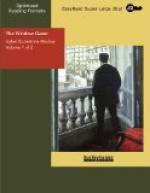The professor was silent so long that Desire added: “I’m sorry. I should have told you before.”
“What difference would it have made?” He roused himself. “Tell me the rest of it. Did Li Ho think that your mother had been frightened by a—thief?”
“I suppose so,” in surprise. “Li Ho blamed himself terribly. He said it was his fault. If they hadn’t known he was in the cells all night they might have suspected him. He acted so queerly. But of course what he meant was that if he had been at home the thief would not have broken in.”
“There were evidences of his having broken in?”
“There was a window open.”
“And were any of the stolen things recovered.”
“Not that I ever heard of. And yet, I think perhaps some of them were. I remember—” Desire paused and a painful flush crept into her cheek.
“Yes?” prompted Spence gently.
“One of the lost things was an old-fashioned watch belonging to mother. I used to listen to it ticking. And once, years after, I saw it. Father had given it to—a friend of his. So, you see, he must have got it back.”
“I see.” The professor was aware of a pricking along his spine. He looked at the unconscious face of the girl and ventured another question.
“Was your father injured at all?”
“His head was hurt. They did not know whether the thief had struck him or whether it was the fall. He had fallen just at the foot of the stairs. We lived in a bungalow, then, and as I was asleep in my little room under the eaves, it was thought that he had been trying to reach me—what is the matter?”
The professor had been unable to control an involuntary shudder.
“Nothing,” he said. “Just nerves.”
Desire’s smile was wistful. “It isn’t a pretty story,” she said. “None of the stories I can tell are pretty. That’s why I am different from other people. But I am trying. Perhaps I shall get to be more like them presently.”
The professor banished his dark thoughts with an effort. “God forbid!” he said cheerfully. “And here comes teat”
CHAPTER XXVII
One wonders what would happen to our admirable muddle of a world, if even a minority of its inhabitants were suddenly to embrace consistency. It would, presumably, be a world still, but so changed that its best friends would not know it. It is because every-body, everywhere and at all times, acts as they could not logically be expected to act, that our dear familiar chaos of you-never-can-tell continues to entertain us.
Had Desire possessed consistency, this quality so jewel-like in its rarity, she would have realized that, having voluntarily stepped aside from woman’s natural destiny, she should also have ceased to trouble herself with those feminine doubts and hopes which are peculiar to it. She would have known that the position of secretary to a professional man does not logically include heart-burnings and questionings concerning that gentleman’s love affairs, past or present. She would have refused to consider Mary. She would have been quite happy in the position she had deliberately made for herself.




